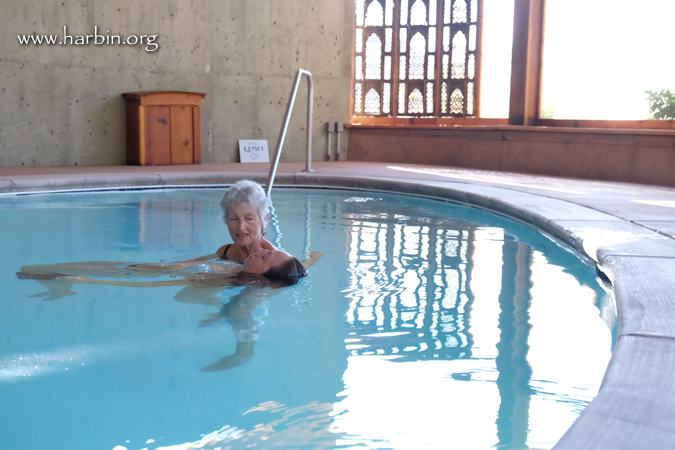The Birthplace of Watsu®

Origins of Watsu
Watsu® (Water Shiatsu) began in 1980 when Harold Dull started floating people in the warm pool here while applying the stretches and principles of the Zen Shiatsu he had studied in Japan.
“In the Orient, stretching as a way to open channels through which our Chi energy flows is even older than acupuncture,” say Harold Dull. “Stretching strengthens muscle and increases flexibility. Warm water like that in the pools at Harbin, which many associate with the body’s deepest states of waking relaxation, proved to be the ideal medium.”
Basic Principles
The support of water takes weight off the vertebrae and allows the spine to be moved in ways impossible on land. Gentle, gradual twists and pulls relieve the pressure a rigid spine places on nerves and helps undo any dysfunctioning this pressure can cause to the organs serviced by those nerves. The Watsu receiver experiences greater flexibility and freedom.
Similarly, during Watsu a range of emotions can come up and be released into the process of continuous flow. This reprograms receivers to face life out of the water with greater equanimity and flexibility. Many come out of a Watsu saying they were more relaxed than they have ever been. Some say it was one of the most powerful experiences in their life.
“Another principle of Zen Shiatsu, that of connecting with the breath, takes on a new dimension in Watsu,” says Harold. “On land, the breathing is coordinated with leaning into points. In water, our most basic move is the Water Breath Dance, in which we float someone in our arms and let them sink a little as they breathe out and let the water lift us as we both breathe in.” Repeated over and over at the beginning of a Watsu, this “Water Breath Dance” creates a connection that can be carried into all the stretches and moves throughout the session.
Multiple Benefits
The lasting benefits of Watsu for special needs have been confirmed by many reports and studies. That its benefits for the general population can also be long lasting was demonstrated by a study at a university in Brazil. Today, in more than 40 countries, used by professional bodyworkers, physical therapists, psychologists, as well as the general public, Watsu is proving its effectiveness with chronic pain and a widening range of conditions.
Aquatic Bodywork
Since it’s beginning here, Watsu has evolved into an entire category of treatments under the umbrella of Aquatic Bodywork. Watsu® and Waterdance™ are the two most popular aquatic modalities practiced at Harbin, but you can find other variations around the world.
Experience Watsu Yourself
If you are interested in experiencing a Watsu or other Aquatic Bodywork session, Harbin Hot Springs is the ideal place to do so. Our practitioners are highly-trained and regularly screened for excellence. Our new semi-private Watsu pool – temperature controlled and shaded – offer an ideal atmosphere for your session.
Check out the various water massage styles available at Harbin, and review rates for sessions of various length. Then stop by the Harbin Health Services office (or call in advance of your visit) to ask questions, view practitioner profiles, and consider if the incredible benefits of Aquatic Bodywork are for you.
Click here for Bodywork Rates & Reservations
Watsu® is a registered service mark assigned to Harold Dull.
To change, cancel or get assistance with Reservations or Pre-Check-In, call 707-987-2477 (9 am to 8 pm)

